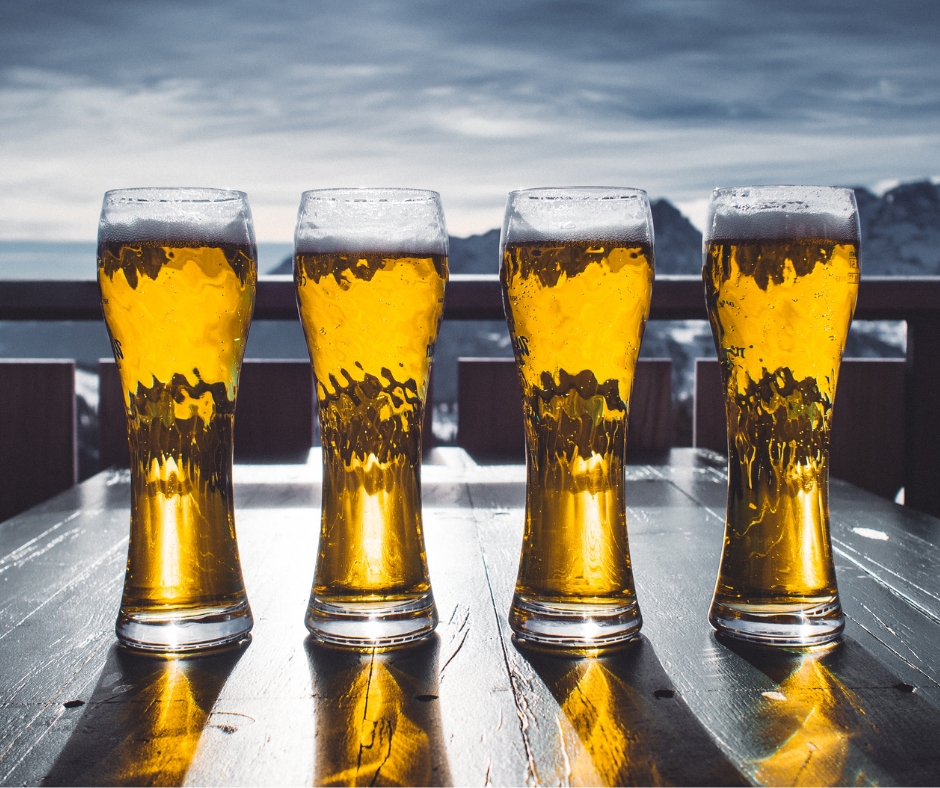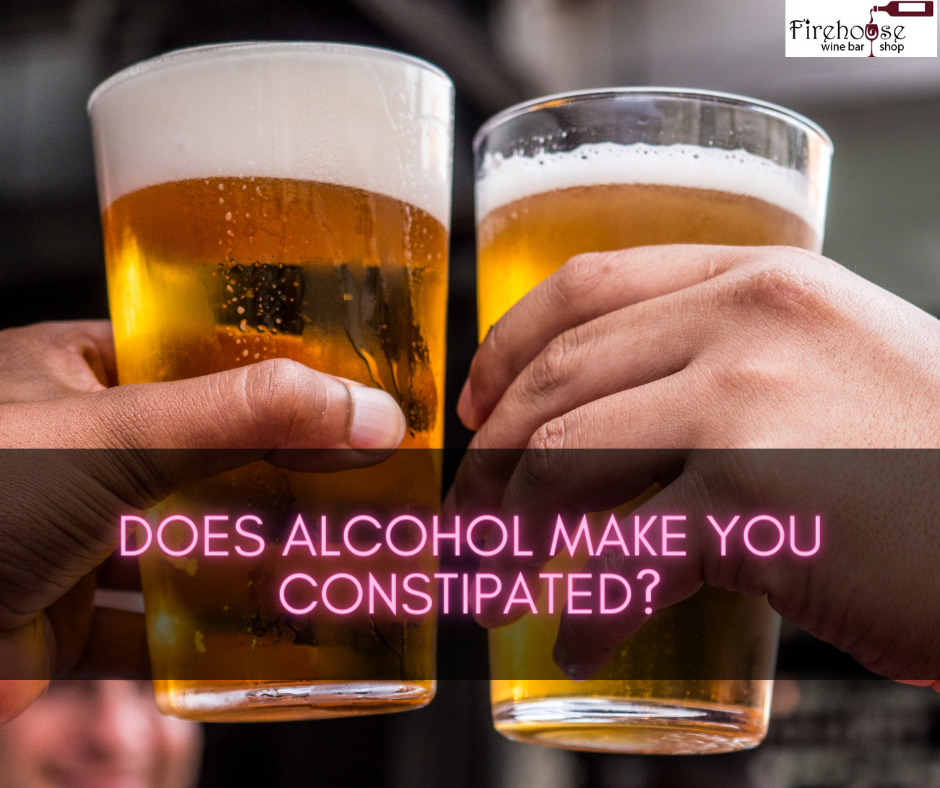Introduction
Alcohol consumption is a common social activity, but have you ever wondered, ‘Does Alcohol Make You Constipated?‘ In this article, we will explore the link between alcohol and constipation to help you better understand the impact it may have on your body.
Overview Of The Topic
Constipation is a condition characterized by infrequent bowel movements or difficulty passing stools. Various factors, including a lack of fiber in the diet, dehydration, and a sedentary lifestyle, can cause it. But what role does alcohol play in all of this?
When it comes to alcohol and constipation, there are a few important points to consider. First, alcohol is a diuretic, which means it can increase urine production and lead to dehydration. Dehydration can result in dry, hard stools that are difficult to pass. Additionally, alcohol can disrupt the normal muscle contractions in the digestive system, which are essential for proper bowel movements. This can further contribute to constipation.
Furthermore, certain types of alcoholic beverages, such as red wine and beer, contain substances called tannins and gluten, respectively, which can also contribute to digestive issues and potentially worsen constipation in some individuals.
Importance Of Understanding The Link Between Alcohol And Constipation
Understanding the link between alcohol and constipation is important for several reasons. Firstly, chronic constipation can lead to discomfort, bloating, and even more serious complications if left untreated. By identifying potential triggers, such as alcohol, individuals can make informed choices about their consumption habits and take preventative measures to alleviate constipation symptoms.
Secondly, being aware of the relationship between alcohol and constipation can also help individuals who may be more prone to this condition. For example, individuals who already have a slow digestive system or are more susceptible to dehydration may find that reducing or avoiding alcohol altogether can significantly improve their bowel regularity.
Lastly, it is important to note that not everyone will experience constipation as a result of alcohol consumption. Individuals are unique, and various factors, such as genetics, overall diet, and lifestyle choices, can influence how their bodies respond to alcohol. Therefore, paying attention to your body’s signals and consulting with a healthcare professional if you have concerns or persistent symptoms is essential.
In conclusion, understanding the link between alcohol and constipation is crucial for maintaining a healthy digestive system. While alcohol can contribute to dehydration and disrupt normal digestive functions, its impact on constipation may vary from person to person. By being mindful of your alcohol consumption and paying attention to your body’s response, you can make informed decisions about your health and well-being.

Does Alcohol Make You Constipated? – How Alcohol Causes Constipation
Alcohol consumption is a common part of social gatherings and celebrations, but have you ever wondered, ‘Does Alcohol Make You Constipated?’ In this article, we will explore the link between alcohol and constipation and understand how alcohol can affect your digestive system and bowel movements.
Dehydration And Its Impact On Stool Absorption
One of the primary ways alcohol can contribute to constipation is through dehydration. Alcohol is a diuretic, meaning it increases urine production and can lead to fluid loss in the body. When you become dehydrated, your body attempts to retain water, which includes pulling water from the colon. This can result in dry and hard stools, making it difficult to pass them.
Effect Of Alcohol On Digestive Tract Function
Alcohol can also affect the normal functioning of the digestive tract, leading to constipation. It can slow down food movement through the intestines, causing bowel movement delays. This delay can result in the stool spending more time in the colon, leading to increased water absorption and firmer stools.
Furthermore, alcohol can disrupt the balance of beneficial bacteria in the gut, known as gut microbiota. These bacteria play a crucial role in maintaining a healthy digestive system. When the balance is disrupted, it can negatively impact bowel movements and increase the risk of constipation.
To answer ‘Does Alcohol Make You Constipated?’, it’s important to note that while alcohol consumption can cause constipation, not everyone will experience this effect. Factors such as individual tolerance, hydration levels, and overall gut health can influence how alcohol affects bowel movements.
To prevent or alleviate alcohol-induced constipation, it is recommended to:
- Stay hydrated: Drink plenty of water alongside alcohol consumption to counteract the dehydrating effects.
- Moderation is key: Limit alcohol intake to avoid excessive dehydration and disruption of digestive function.
- Maintain a balanced diet: Consuming a diet high in fiber can help promote regular bowel movements and prevent constipation.
- Support gut health: Consider incorporating probiotic-rich foods or supplements to maintain a healthy balance of gut bacteria.
In conclusion, while alcohol can cause constipation in some individuals, it is not a universal effect. Understanding the potential impact of alcohol on your digestive system and taking steps to mitigate any adverse effects can help you enjoy a balanced and healthy lifestyle. Remember to drink responsibly and prioritize your overall well-being.

Tips For Preventing Constipation From Alcohol
Importance Of Staying Hydrated And Drinking Water
When it comes to preventing constipation caused by alcohol consumption, one of the most important factors to consider is hydration. Alcohol is known to dehydrate the body, which can lead to hard and dry stool. To counteract this, it is crucial to stay adequately hydrated by drinking water while consuming alcohol.
Drinking water not only helps keep the body hydrated, but it also aids in digestion and promotes regular bowel movements. Aim to drink at least eight glasses of water a day, and be sure to increase your intake when consuming alcohol to prevent dehydration and potential constipation.
Strategies For Reducing Or Avoiding Alcohol-induced Constipation
While staying hydrated is essential, there are other strategies you can implement to reduce or avoid alcohol-induced constipation. Here are a few tips to consider:
- Moderate alcohol consumption: Excessive consumption of alcohol can hurt your digestive system. Limiting your alcohol intake can help prevent constipation and promote better overall digestive health.
- Include fiber-rich foods in your diet: Fiber is crucial in maintaining regular bowel movements. Incorporate fiber-rich foods such as fruits, vegetables, whole grains, and legumes into your diet to promote healthy digestion and prevent constipation.
- Exercise regularly: Regular physical activity helps stimulate bowel movements and can help prevent constipation. Engage in exercises such as walking, jogging, or yoga to keep your digestive system functioning optimally.
- Avoid mixers that can contribute to constipation: Some alcoholic beverages may contain mixers that are high in sugar or artificial sweeteners, which can contribute to constipation. Opt for mixers that are low in sugar or choose healthier alternatives like club soda or fresh fruit juice.
- Consider probiotics: Probiotics are beneficial bacteria that can help promote a healthy gut and improve digestion. Adding probiotic-rich foods like yogurt or a probiotic supplement may help prevent constipation.
- Manage stress: Stress can hurt your digestive system, leading to constipation. Implement stress management techniques like meditation, deep breathing exercises, or engaging in hobbies to reduce stress and promote healthy digestion.
By following these tips, you can help prevent or alleviate the symptoms of alcohol-induced constipation. Remember always to drink alcohol in moderation and listen to your body’s needs to maintain a healthy digestive system.

Understanding The Role Of Medications
Alcohol consumption and its effects on the body have long been topics of interest. One common question that arises is whether alcohol can make you constipated. To answer this, it’s essential to understand the role of medications in the interaction between alcohol and constipation.
Interaction Between Alcohol And Certain Medications
It’s no secret that certain medications can have side effects. In some cases, these side effects may include constipation. Alcohol can further exacerbate the situation when consumed alongside these medications. For example, painkillers, muscle relaxants, and antidepressants are known to cause constipation. Drinking alcohol while taking these medications can heighten the risk or severity of constipation symptoms.
Some medications slow the rate at which food moves through the digestive system. This delay can lead to increased water absorption in the colon, resulting in dry and hard stools. Alcohol, on the other hand, has a similar effect on the digestive system. It acts as a diuretic, causing increased water loss from the body and leading to dehydration. This can further aggravate constipation symptoms.
Importance Of Consulting With A Healthcare Professional
If you are taking medications and experiencing constipation, it’s crucial to reach out to your healthcare professional for guidance. They can provide information about your situation and advise on effectively managing constipation.
A healthcare professional can guide you on the potential interactions between the medications you are taking and alcohol. They can determine whether alcohol consumption is safe or if moderation or abstinence is necessary for your specific medication regimen.
Additionally, a healthcare professional can help identify alternative remedies or suggest dietary changes to alleviate constipation without compromising your medication plan. They can also recommend increasing fluid intake, adding fiber to your diet, and incorporating exercise to promote regular bowel movements.
Overall Approach
In the discussion of alcohol and constipation, it is important to remember that moderation is key. While there may be a link between alcohol consumption and constipation, it is not a guaranteed outcome for everyone.
Each person’s body reacts differently to alcohol and medications, so it’s essential to pay attention to individual experiences. If you notice that alcohol consistently contributes to constipation symptoms, it may be best to limit or avoid alcohol consumption altogether.
Ultimately, consulting with a healthcare professional is crucial for accurate guidance tailored to your situation. They can provide the most appropriate advice based on your medication regimen and overall health.
Taking a proactive approach to managing your health and well-being is always recommended, and seeking professional advice can help you make the best decisions for your overall digestive health.
FAQ: Does Alcohol Make You Constipated? Sip or Stop: The Link Between Alcohol and Constipation
Q: Can drinking alcohol cause constipation?
A: Yes, drinking alcohol can potentially cause constipation. While for some individuals, alcohol may have a laxative effect, for others, it can lead to symptoms like bloating and constipation.
Q: How does alcohol cause constipation?
A: There are a few ways in which alcohol can contribute to constipation. Firstly, it can cause an overgrowth of intestinal bacteria, which can lead to digestive issues. Additionally, alcohol consumption can lead to dehydration and slow down intestinal emptying, both of which can contribute to constipation.
Q: Can the type and amount of alcohol consumed affect constipation?
A: Yes, both the type and amount of alcohol consumed can play a role in causing constipation. Drinks with higher alcohol content may increase the risk of constipation. Also, excessive long-term alcohol consumption can cause a person to develop diarrhea or faster bowel emptying.
Q: Can dietary habits and lifestyle choices help prevent constipation when drinking alcohol?
A: Yes, making certain dietary and lifestyle choices can help prevent constipation when consuming alcohol. Eating a diet rich in fiber, drinking plenty of water, and exercising regularly can all contribute to maintaining regular bowel movements.
Q: What should I avoid when drinking alcohol to prevent constipation?
A: When drinking alcohol, it is advisable to avoid excessive consumption as it can lead to dehydration. It is also recommended to avoid caffeinated drinks, as caffeine can contribute to dehydration and worsen constipation symptoms. Additionally, drinks with high sugar content should be avoided.
Q: Should I consult a healthcare professional about alcohol and constipation?
A: If you are concerned about the potential link between alcohol and constipation, it is important to talk to your doctor or pharmacist. They can guide any potential interactions between the medications you are taking and alcohol consumption.
Conclusion
Summary Of Key Points Discussed
Now you should know the answer to ‘Does Alcohol Make You Constipated?’. In this article, we examined the link between alcohol consumption and constipation. While occasional and moderate alcohol consumption may not have a significant impact on digestion, excessive drinking can lead to constipation or exacerbate existing constipation issues. It is important to be aware of your own body and how it reacts to alcohol, as well as to listen to any symptoms or discomfort you may experience.
We learned that alcohol can have a dehydrating effect on the body, which can contribute to constipation. Additionally, certain types of alcoholic beverages, such as those high in tannins or sugar, may be more likely to cause digestive issues. Staying hydrated and consuming a balanced diet to support normal bowel movements is important.
The Importance Of Moderation And Being Informed About The Impact Of Alcohol On Digestion
While enjoying an occasional drink is generally considered safe and can be a social and enjoyable experience, it is important to understand the potential effects of alcohol on digestion. Being informed about how alcohol can affect your body can help you make more mindful choices and avoid or alleviate constipation issues.
Maintaining moderation is key. If you frequently experience constipation or have other digestive concerns, it may be helpful to limit or avoid alcohol altogether. It is also important to consider your overall lifestyle, including diet, exercise, and stress levels, as these factors can all contribute to digestive health.
Everyone’s body is different, and what works for one person may not work for another. If you are experiencing persistent or severe constipation or other digestive issues, it is always best to consult a healthcare professional who can provide personalized advice and guidance.
By educating yourself about the potential effects of alcohol on digestion and making informed choices, you can strike a balance between enjoying a drink and maintaining good digestive health.
Ultimately, the decision to sip or stop is personal, and it is important to prioritize your well-being and make choices that support your overall health and digestive comfort.

Andre Lotz immigrated to the United States from South Africa almost 20 years ago. Still, he didn’t feel truly at home until he settled in Mobile—a city that reminds him of his childhood home of Fish Hoek on the southern cape of Africa.

